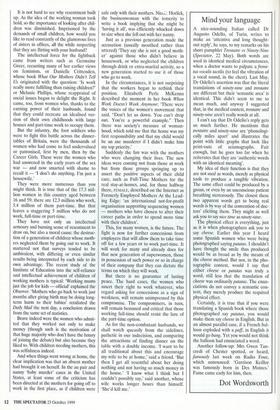Mind your language
A nice-sounding Italian called Dr Augusto Odello, of Turin, writes to make an 'attentive and long thought- out reply', he says, to my remarks on his short pamphlet Trentatre vs Ninety-Nine (Spectator, 22 May). Both words are used in identical medical circumstances, when a doctor wants to palpate a fremi- tus vocalic tactilis (to feel the vibration of a vocal sound, in the chest). Last May, Dr Odello's assertion was that the literal translations of ninety-nine and trentatre are different but their 'semantic area' is identical. This didn't seem to me to mean much, and anyway I suggested that, in the medical context, trentatre and ninety-nine aren't really words at all.
I can't say that Dr Odello's reply gets us much further. He mentions that trentatre and ninety-nine are 'phonologi- cally miles apart' and illustrates the point with little graphs that look like print-outs of seismographs. Fair enough, but he goes too far when he reiterates that they are 'authentic words with an identical meaning'.
My idea of their function is that they are not used as words, merely as physical tools to produce a tangible vibration. The same effect could be produced by a groan, or even by an unconscious patient breathing stertorously. The closest these two apparent words get to being real words is by way of the convention of doc- tors' eliciting them. They might as well ask you to say nice time as ninety-nine.
The physical effect is everything, just as it is when photographers ask you to say cheese. Earlier this year I heard some Spanish women who were being photographed saying patatas. I shouldn't have thought the smile thus produced would be as broad as by the means of the cheese method. But nor, in the pho- tographic context, would I say that either cheese or patatas was truly a word, still less that the translation of cheese was ordinarily patatas. The enun- ciations do not convey a semantic con- tent, they merely produce the required physical effect.
Certainly, it is true that if you were translating a Spanish book where those photographed say patatas, you would make them say cheese in English. But in an almost parallel case, if a French bal- loon exploded with a paff, in English it would go bang. Yet you would not think the balloon had enunciated a word.
Another follow-up: Mrs Gwen Tan- credi of Chester spotted, or heard, famously last week on Radio Four, which announced: 'Garrison Keillor was famously born in Des Moines.' Fame came early for him, then.
Dot Wordsworth


















































































 Previous page
Previous page